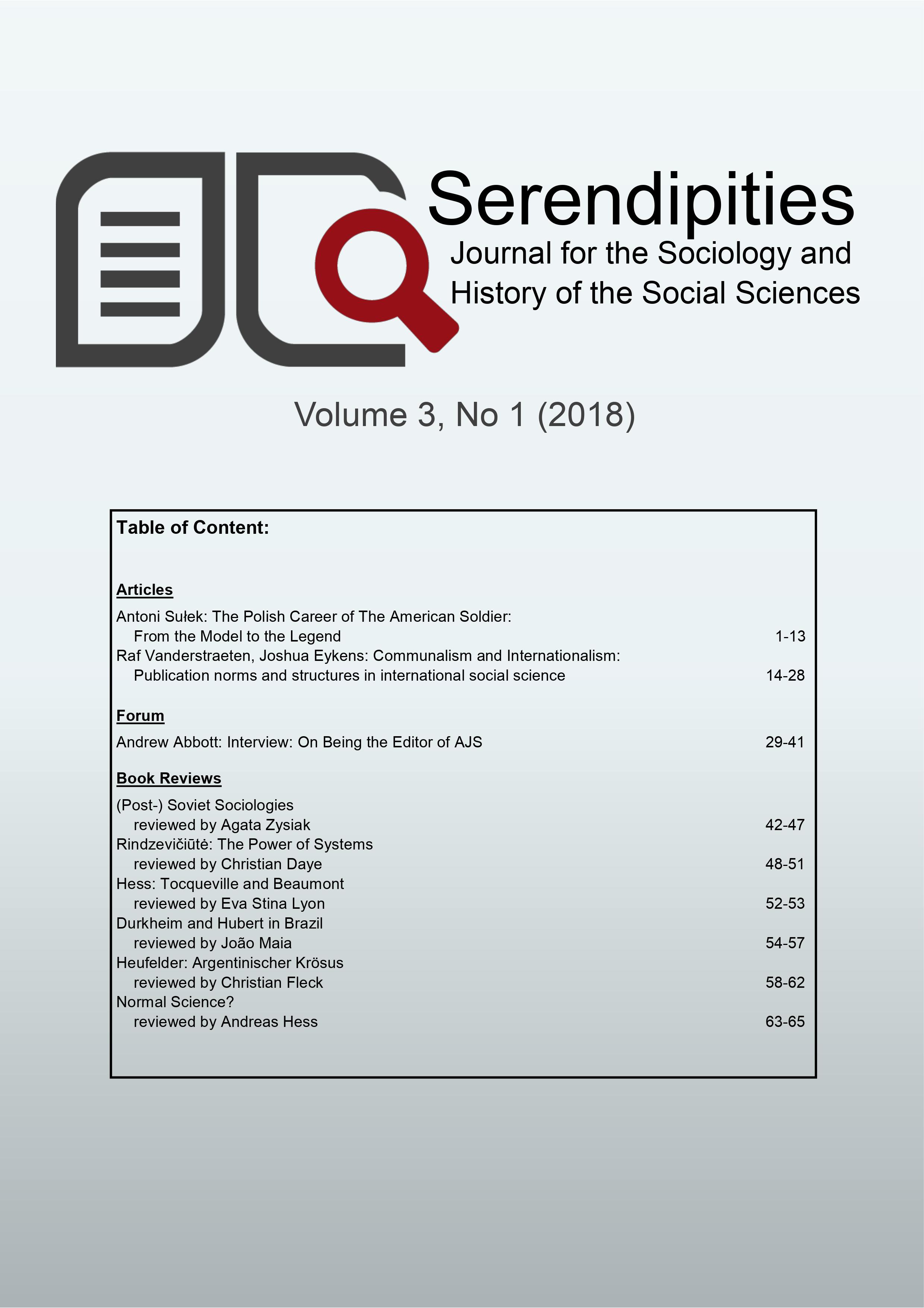Rindzevičiūtė: Power of Systems
DOI:
https://doi.org/10.25364/11.3:2018.1.5Keywords:
history of the social sciences in the Cold War eraAbstract
Book review of:
Rindzevičiūtė, Eglė. 2016. The Power of Systems: How Policy Sciences Opened Up the Cold War World. Ithaca, London: Cornell University Press, 2016.
306 pp.
ISBN: 978-1-5017-0318-8
Price: $ 49.95
References
Aronova, Elena, and Simone Turchetti (Eds.). (2016). Science Studies during the Cold War and Beyond: Paradigms Defected. New York: Palgrave Macmillan.
Boldyrev, Ivan, and Olessia Kirtchik. (2016). On (Im)Permeabilities: Social and Human Sciences on Both Sides of the “Iron Curtain.” History of the Human Sciences, 29 (4–5), 3–12. https://doi.org/10.1177/0952695116666748.
Brooks, Harvey, and Alan McDonald. (2000). The International Institute for Applied Systems Analysis, the TAP Project, and the RAINS. In Agatha C. Hughes and Thomas P. Hughes (Eds.), Systems, Experts, and Computers: The Systems Approach in Management
and Engineering, World War II and After (pp. 413–32). Cambridge (Mass.), London: The MIT Press.
Duller, Matthias. (2016). Internationalization of Cold War Systems Analysis: RAND, IIASA and the Institutional Reasons for Methodological Change. History of the Human Sciences, 29 (4–5), 172–90. https://doi.org/10.1177/0952695116667882.
Edwards, Paul N. (1996). The Closed World. Computers and the Politics of Discourse in Cold War America. Cambridge (MA), London: The MIT Press.
Engerman, David C. (2009). Know Your Enemy: The Rise and Fall of America’s Soviet Experts. Oxford; New York: Oxford University Press.
Gerovitch, Slava. (2002). From Newspeak to Cyberspeak: A History of Soviet Cybernetics. Cambridge (MA), London: The MIT Press.
Heyck, Hunter. (2015). Age of System: Understanding the Development of Modern Social Science. Baltimore (MD): Johns Hopkins University Press.
Jardini, David. (2000). Out of the Blue Yonder: The Transfer of Systems Thinking from the Pentagon to the Great Society, 1961-1965. In Agatha C. Hughes and Thomas P. Hughes (Eds.), Systems, Experts, and Computers: The Systems Approach in Management and
Engineering, World War II and After (pp. 311–58). Cambridge (MA), London: The MIT Press.
Levien, Roger E. (2000). RAND, IIASA, and the Conduct of Systems Analysis. In Agatha C. Hughes and Thomas P. Hughes (Eds.), Systems, Experts, and Computers: The Systems Approach in Management and Engineering, World War II and After (pp. 433–62). Cambridge (Mass.), London: The MIT Press.
Light, Jennifer S. (2003). From Warfare to Welfare. Defense Intellectuals and Urban Problems in Cold War America. Baltimore, London: The Johns Hopkins University Press.
Riska-Campbell, Leena. (2011). Bridging East and West: The Establishment of the International Institute for Applied Systems Analysis (IIASA) in the United States Foreign Policy of Bridge Building, 1964-1972. Commentationes Scientiarum Socialum 75. Helsinki: The Finnish Society of Science and Letters.
Thompson, Michael. (1984). “Among the Energy Tribes: A Cultural Framework for the Analysis and Design of Energy Policy.” Policy Sciences 17(3), 321–39. https://doi.org/10.1007/BF00138710.
Downloads
Published
How to Cite
Issue
Section
License
CC-BY-NC-ND





